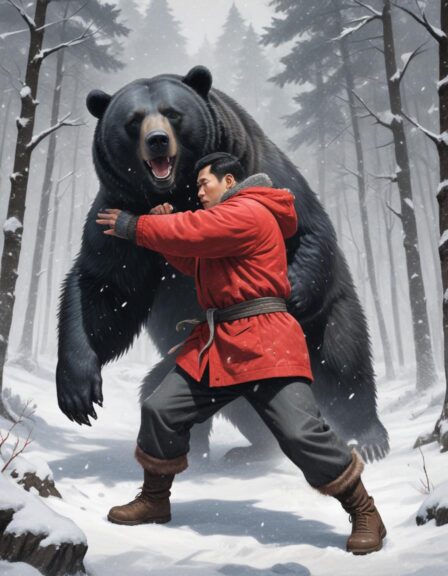The Legend of Gigantor
The bar on the outskirts of Niihama-shi wasn’t much to look at. A neon sign buzzed weakly, its colors bleeding into the night air, and the wood-paneled walls bore the scars of time and too many careless elbows. Noritada Akiyama, owner of the “Most Games Pitched” record (483) in Ghosts history, had made it his second home in the off-season, a place where he could sit and let the gin burn away the weight of the game.
He had been coming here for weeks when the women began to appear. Baseball season was over, and the stories about the Niihama-shi Ghosts were in demand. They came in ones and twos, their laughter ringing in the dim light, all wanting to hear about Jin-song Zambrano—the superstar shortstop, the six-foot-four colossus who loomed like a god on the diamond. They didn’t care much for Akiyama, who was steady but unspectacular, just another cog in the machine. But he had stories, and he told them in a slow, steady voice, his words like raindrops gathering into a stream.
The first woman, a university student with sharp eyes, asked about the nickname.
“Gigantor,” she said, leaning closer. “Why do they call him that?”
Akiyama sipped his gin, the glass heavy in his hand. He studied her face for a moment, then let the lie tumble out.

The student laughed, her disbelief polite. Akiyama didn’t care. He drained his glass and gestured for another.
The next night, a pair of women arrived—sisters, maybe, judging by the way they mirrored each other’s movements. The elder one asked about Gigantor, her voice lilting with curiosity.

“Zambrano?” Akiyama said, his words already loose with drink, each syllable swaying like a man trying to steady himself on a ship’s deck. “He got the name because he built a bridge, all by himself. Out of bamboo and rope. Spanned an entire river—one of those raging ones, the kind that swallows cattle whole during monsoon season. Took him three days, working from dawn till the cicadas stopped screaming at night. He didn’t even eat, just chewed on some bitter leaves the locals swore gave him the strength of ten men. They say he didn’t sleep, either, just stared into the river like he was daring it to rise higher. When it was done, the bridge didn’t creak, not even under the weight of a whole ox cart. The village elders—those wrinkled old men who always seem to be sucking on pipes or spitting into the dust—they called him a ‘walking miracle,’ like he was some kind of divine carpenter sent down to save their miserable lives. That’s why he’s Gigantor, you see. Not just because he’s tall. He’s big, in a way you and I will never be.”
The sisters whispered to each other, their skepticism barely hidden. Akiyama shrugged and let the lie hang in the smoky air.
By the third night, the lies had taken on a life of their own. Akiyama had drunk enough to forget the edges of the room, the faces of the women blurring together.
 “He fought a dragon,” he slurred to a pale woman with tired eyes. “Not just any dragon—one of those ancient ones, the kind that guards treasure. It was in a cave. He wrestled it for hours, and when he finally pinned it, the dragon whispered, ‘Gigantor,’ before vanishing in a puff of smoke.”
“He fought a dragon,” he slurred to a pale woman with tired eyes. “Not just any dragon—one of those ancient ones, the kind that guards treasure. It was in a cave. He wrestled it for hours, and when he finally pinned it, the dragon whispered, ‘Gigantor,’ before vanishing in a puff of smoke.”
The woman laughed, the sound soft and pitying.
By the fourth night, Akiyama was barely upright. A young woman with a quiet smile asked him to tell her about Zambrano.
“Gigantor,” Akiyama began, his voice heavy and slow. “He’s big, sure. But that’s not why. It’s…” Akiyama glassily thumbed the lip of his tumbler, his mind adrift on a quiet and lonesome cloud, “… because he carries us all. Every game, every inning, every damn moment we falter—he’s there. Like a machine, like something bigger than us all. He’s Gigantor… because he has to be.”
The woman nodded, and Akiyama saw her eyes shine with understanding. He finished his drink and stared into the empty glass. The lies had been easy, but the truth was harder, heavier, and he wasn’t sure he could carry it anymore.
The bar hummed around him, and for a moment, he thought about Zambrano—how he stood tall on the field, the weight of the team on his broad shoulders. Akiyama closed his eyes, the warmth of the gin sinking into his chest, and thought about what it meant to be small in the shadow of something so big, at least for a time.



